
How to support someone coming out in their 30s and beyond
Coming out can be hard at any age, but by the time you’re well into adulthood it may feel terrifying, and be completely life-changing. Many people who come out in their thirties and onwards may have wanted to for a long time but not felt safe enough to do so. As October 11 marks National Coming Out Day, it’s important to reflect on how, if and when people can share their authentic selves. “I wasn’t raised in a time when it felt safe to express attraction to women,” says author and creative mentor Fiona Fletcher Reid, who came out last year at the age of 35. “I wasn’t sure about my sexuality until I had psychosexual therapy and was able to explore all the layers of internalised homophobia and repression that I had accumulated over my 35 years,” she says. So, how you can support someone who is going through it? Don’t assume everyone is the same Not every person’s coming out looks the same, and some LGBTQ+ experiences are not universal. “Coming out is a personal experience and because it is often physically and emotionally dangerous to be openly queer, lots of people never feel able to be open,” says Fletcher Reid, now 36. “Some people might feel free to come out once they have ended a particular relationship, or after meeting people who they feel safe around. “For others, like me, it’s that we don’t consciously acknowledge our sexuality until we are a lot older and have the confidence to work through the emotional implications and real-life consequences that come with that,” The writer, from Glasgow, was going through a divorce at the time with a man she’d been with since the age of 17. “During therapy, I talked a lot about the pain I was experiencing during intercourse as well as my general anxiety around sex. It wasn’t until I’d built up a trusting relationship with my therapist that I felt able to discuss the fact that I thought I might be gay and I did not expect that to come up, so I was just as surprised as everyone else when I came out.” Don’t question their authenticity Validate what the person who has come out is saying. “Don’t say, ‘Are you sure?’ because you can rest assured that the person coming out to you has thought long and hard about this,” says Fletcher Reid. “Casting self-doubt on someone when they have opened up a vulnerable part of themselves to you is hurtful.” Don’t question them about their sex life It’s no one else’s business. “Please don’t ask about whether they have been intimate with anyone, or any other sort of suggestion that they need to ‘prove’ their sexuality to you,” she stresses. Consider what they feel and accept that it is a big deal They are probably feeling “a mix of emotions, including excited, happy, empowered and scared for their safety”, says Fletcher Reid. “Sadly coming out can still cause huge ruptures in relationships so be aware that this is a huge moment for them and comes with real consequences. “Dismissing their experience as ‘not a big deal’ because you think it’s ‘normal to be gay’ now is a dangerous and false narrative.” It may sound simple, but just listening and supporting them is vital. “Be there to listen and try to celebrate all the new things that they are exploring as they come out, whether that’s dating, meeting new people or finding ways to experiment with their identity through fashion,” says Fletcher Reid. “Repeat often that you love and care for them and that you accept this evolution of them, that you are happy to see them happy.” Suggest they find community “Encourage them to talk to other people who have been through similar experiences if you can,” she says. “As much as friends and family want to understand what they are going through, it is far more validating to talk to someone else who has come out later in life and understands the emotional intricacies of the experience. “They can also hopefully show them that there are good times ahead.” Thank them for sharing with you “It is a privilege that someone trusts you with coming out, especially later in life. Tell them that you are honoured to have been trusted with this information, and reassure them that you will keep it private until they are ready to tell other people,” Fletcher Reid suggests. “The best reactions that I had from people were seeing their joy that I had discovered this important part of myself, and that had a huge impact on my ability to feel hopeful amidst the pain caused by my divorce. “Allowing them to feel conflicted and guilty and offering reassurance that they have the right to be themselves will make them feel so much happier.” Read More Israel-Hamas conflict: How to talk to teenagers about distressing news stories Autumn décor ideas for a seasonal refresh Why you shouldn’t tidy your garden too much in autumn World Mental Health Day: 5 ways to beat anxiety and change your life Alternative veg to grow for next season How to spot if your child is struggling with their mental health – and what to do next
2023-10-11 13:54
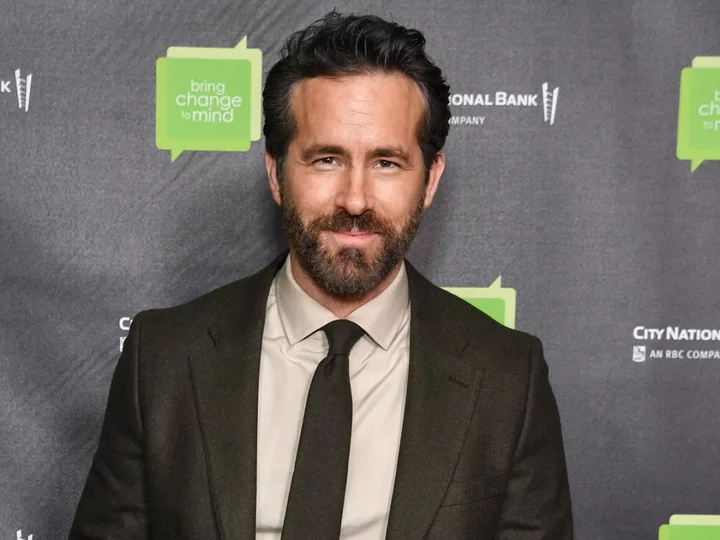
Ryan Reynolds opens up about how his mental health spins ‘out of control’
Ryan Reynolds has spoken candidly about his mental health, revealing that his mind can “spin out of control” sometimes. The actor, 46, spoke candidly about his mental health challenges during an interview with Page Six on 9 October, while attending non-profit organisation Bring Change to Mind’s annual Revels & Revelations Gala. Speaking to the outlet, he revealed that he’s found himself spinning “out of control” at times, before noting that he’s “not always great” at maintaining his mental equilibrium. However, Reynolds shared some routines that he follows when struggling with his mental health. “I certainly have my own little rituals and those kinds of things that help me stay grounded and keep my mind from spinning out of control,” he said. “Sometimes I’m really good at it, sometimes I’m not.” The Deadpool star noted that when he becomes aware of those “out of control” moments, he meditates in order to “take the time” for himself to regroup. He also shared how he’s become aware of his own lifestyle traits that he wants to work on amid his mental health struggles. “I tend to overbook myself when I’m spiraling that way,” he said. “I’m sort of aware of that stuff and I manage it as well as you can.” This isn’t the first time that Reynolds has spoken out about his mental health. He first opened up about his struggles with anxiety in February 2022 during an appearance on CBS’s Sunday Morning. “I’ve had anxiety my whole life really and you know, I feel like I have two parts of my personality. That one takes over when that happens,” he said. He also recalled how his feelings of anxiety would intensify before appearances on talk shows, such as Late Night With David Letterman. “I remember I’d be standing backstage before the curtain would open,” he said. “And I would think to myself: ‘I’m gonna die. I’m literally gonna die here. The curtain’s gonna open and I’m just gonna be a symphony of vomit.’ Just, like, something horrible’s gonna happen!” The Green Lantern star then noted that “as soon as that curtain opens” before he goes on stage, “this little guy takes over” that ultimately helps him manage his anxiety. “And he’s like: ‘I got this. You’re cool.’ I feel, like, my heart rate drop and my breathing calm, and I just sort of go out and I’m this different person. And I leave that interview going: ‘God, I’d love to be that guy!’” he said. During his appearance at Bring Change to Mind’s event on 11 October, Reynolds also discussed conversations that he and his wife, Blake Lively, have with their children about mental health. “I think it’s more about talking to them about everything,” he told People at the gala. “It’s genuine when I say I take a huge interest in their days and how things are going.” Reynolds and Lively, who’ve been married since 2012, share three daughters: James, eight, Inez, seven, and Betty, four. In February, they welcomed their fourth child, whose name hasn’t been publicly revealed. The Free Guy star also explained that the “best time” of his day is when he walks his children to and from school. When discussing some of the challenges that children often face, Reynolds praised his daughters for the self-awareness they’ve developed. “I think as parents, we are so much better equipped to handle the rigours of childhood through our kids now than when I was a kid. It’s just totally different now,” he said. “People are much more self-aware. And that’s the thing we sort of hang our hat on the most is self-awareness with our kids. Not be happy, not be anything, just be self-aware and welcome everything in.” Read More Ryan Reynolds describes experience attending Travis Kelce’s game with Taylor Swift From double dates to parenthood: A timeline of Blake Lively and Ryan Reynolds’ relationship NFL defends Taylor Swift coverage during games as Travis Kelce says they’re ‘overdoing it’ Ryan Reynolds describes experience attending Travis Kelce’s game with Taylor Swift Pokemon’s Detective Pikachu Returns and more top games of the week Travis Kelce reveals the two people who helped him woo Taylor Swift
2023-10-11 05:16

World Mental Health Day: 5 ways to beat anxiety and change your life
Anxiety is something that touches most of us, to a greater or lesser extent. Although it may just be a temporary blip for some people, for many, anxiety is a diagnosed condition that blights their lives. Indeed, Mental Health UK estimates more than one in 10 people in the UK are living with an anxiety disorder – that’s over eight million of us. And World Mental Health Day (October 10) is a chance to address the topic, agrees clinical psychologist Dr Kirren Schnack – author of the new book Ten Times Calmer: Beat Anxiety And Change Your Life. “It’s a reminder that mental wellbeing is just as important as physical health,” she says, pointing out that anxiety disorders are among the most widespread mental health issues globally. “Clinically, I’ve seen more and more people coming in with anxiety issue. The pandemic has played a significant role in this surge, introducing unprecedented levels of uncertainty, fear, and social isolation. At the same time, global economic instability and job losses have intensified stress and anxiety for many,” Schnack adds. “The widespread use of digital technology and social media has exposed people to a constant stream of alarming news and comparison-driven content that also feeds anxiety.” Schnack explains that anxiety disorders include generalised anxiety disorder (GAD), which causes chronic worry and hinders decision-making; health anxiety, where there’s an excessive preoccupation with diseases and illness; panic disorder, which is marked by sudden overwhelming panic attacks; and social anxiety, which leads to avoidance, isolation and low confidence. “They can blight daily life through physical symptoms, cognitive impairment, social isolation, disrupted routines, and emotional distress,” she says. Schnack suggests these five ways to combat anxiety problems and find calm… 1. Calm your stressed nervous system Anxiety places significant strain on the nervous system, Schnack explains, but there are simple daily practices that can help alleviate this stress. One is focusing on breathing, extending your exhale longer than your inhale. To do this, Schnack says you need to inhale gently through your nose, pause for a few seconds, then exhale slowly and deeply, ensuring an extended exhale. “A longer exhale helps by increasing the activation of the body’s parasympathetic nervous system, which counteracts stress hormones, lowers heart rate, and reduces overall physiological stress,” she says. She suggests around three to five of the breaths are repeated on multiple occasions throughout the day, and stresses that consistency is key. “Recognise that if anxiety has been a longstanding presence, it will take time and patience to restore your nervous system’s sense of safety and stability.” 2. Address anxious thoughts Schnack explains that anxiety often generates anxious thoughts that can seem like undeniable facts that are often dwelled on and reacted to, thus intensifying anxiety. “To break free from this cycle, it’s crucial to consciously confront and process these anxious thoughts,” she says. To do this, write a simple record, noting the date of your anxious prediction, describing what it was, and then, after a specified time like a day or two, return to what you’ve written and confirm whether the prediction was accurate by marking it as ‘yes’ or ‘no’. When the prediction doesn’t materialise, make a note of the actual outcome. Revisit the record, especially during anxious moments, and count the yes or no entries to reflect on your progress. “This practice trains your mind to adopt a broader, less anxious perspective,” explains Schnack. 3. Stop over-focusing on anxiety“People struggling with anxiety often find it challenging to shift their attention away from anxiety symptoms, leading to a persistent preoccupation that can worsen their problems,” says Schnack, who explains that this preoccupation can lead to excessive self-analysis, fixation on physical sensations or repetitive thoughts, and being hypervigilant. To shift your attention away from overwhelming anxiety, Schnack suggests trying this exercise: choose a colour, such as blue, and actively seek out blue objects in your surroundings. Name them out loud, and count them as you move around, possibly describing the item too. “Strive to maintain this focus for a few minutes, switching to different colours if necessary. Again, consistency is crucial, so make an effort to practice this regularly whenever anxiety hijacks your attention,” she advises. 4. Learn to tolerate uncertainty Recognising and addressing uncertainty is vital when dealing with anxiety, Schnack stresses. “You can’t resolve every uncertainty in life – the key lies in enhancing your ability to tolerate uncertainty so you can reduce your anxiety,” she explains. “Being more accepting of the fact that things may not always go as planned or that the future is uncertain can be incredibly liberating.” To help build resilience against uncertainty, Schnack advises people to take a moment to slow down and not immediately engage in reactive behaviour demanded by uncertainty, such as checking, Googling or avoiding things. Instead, she says, note your feelings, observing what uncertainty is doing to your mind and body, and write out an affirmation such as: ‘I’m feeling anxious because I’m uncertain about… My typical response to uncertainty is to engage in… behaviour. I recognise this only worsens my anxiety. My goal is to distance myself from anxiety rather than gravitate towards it. I can sit with the feeling of uncertainty for as long as I can, and build on this time until I get better and better at it.’ 5. Gradually face your fearsConfronting your fears is an effective way to overcome them, observes Schnack, although this can often feel overwhelming. “When you confront your fears, you’re essentially acting in opposition to your anxious thoughts and what anxiety is telling you. This process weakens anxiety’s grip on you, and when the actual outcomes don’t align with your anxious predictions, your mind can naturally adjust its thinking.” She suggests starting with small steps and gradually building up. So, for social anxiety, gradually start by saying a simple sentence or asking a basic closed question, and gradually building up from there. For health anxiety, gradually reduce and eliminate excessive online researching about illness and diseases, starting with small-time durations and then building on that. For panic disorder, gradually spend more time in places you typically avoid, starting with short durations like 30 seconds, then a few minutes, and gradually keep increasing the time. “Remember to repeatedly face your fears to make meaningful progress – it’s not just a one time thing,” adds Schnack. Ten Times Calmer: Beat Anxiety And Change Your Life by Dr Kirren Schnack is published by Bluebird, priced £16.99. Available now. Read More Alternative veg to grow for next season How to spot if your child is struggling with their mental health – and what to do next Does your pillowcase make a difference to your skin and hair health? Sarah Jessica Parker channels Carrie Bradshaw on the red carpet in mismatched shoes Does your pillowcase make a difference to your skin and hair health? As transphobic hate crimes rise by 11% in a year, how to be a better ally
2023-10-10 14:17

Elizabeth Hurley issues reminder to women about getting mammograms as she raises awareness about breast cancer
Elizabeth Hurley has issued a reminder to women about getting mammograms, in honour of her partnership with Estée Lauder’s Breast Cancer Awareness campaign. The model, 58, spoke candidly about mammograms – which are X-rays performed on women’s breasts to screen for cancer – during a recent interview withUs Weekly. While discussing her last 28 years as the ambassador of Estée Lauder’s campaign, she told women that if they feel something “abnormal” when examining their bodies, they shouldn’t hesitate to get it checked by a doctor. “I think the most important thing you can do is familiarise yourself with your breasts because they’re yours and only you know how they feel,” she said. “You should recognise something when it’s abnormal, and you should go to the doctor right away.” Hurley emphasised that annual screenings for breast cancer are not only “vital,” but they should be considered a part of “looking after your health in every way”. She also went on to urge women to be “breast cancer bullies” by continuing to encourage their loved ones to get checked for the disease. “Make sure your friends, your family, your mother, your grandmother, that they’re going for their screenings regularly and urge them to self-check,” she said. “It doesn’t discriminate. It can hit anybody. Some groups are more vulnerable than others.” She also made a reference to one breast cancer that can be difficult to treat, triple-negative breast cancer, which “differs from other types of invasive breast cancer” because “it tends to grow and spread faster, has fewer treatment options, and tends to have a worse prognosis”, as noted by the American Cancer Society. The type of cancer can also be “more common in women younger than age 40, who are Black, or who have a BRCA1 mutation”. “It disproportionately affects Black women,” the Bedazzled star added. “It’s a diverse disease and it needs to be attacked in a diverse way.” According to the American Cancer Society, women between the ages of 45 and 54 “should get mammograms every year”. Meanwhile, women who are 55 and older can either “switch to a mammogram every other year, or they can choose to continue yearly mammograms”. In addition, women between the ages of 40 and 44 “have the option to start screening with a mammogram every year”. The organisation also noted that breast cancer is the most common cancer in women, with estimates of “about 297,790 new cases of invasive breast cancer” being diagnosed in women in the US in 2023. Over the years, Hurley has continued to speak about the importance of getting a mammogram. Last year, she joined Loose Women hosts Kaye Adams, Brenda Edwards, Nadia Sawalha, and Carol McGiffin for a self-examination on live TV. During the segment, she also opened up about losing her own grandmother to the disease, and how her attitudes towards breast cancer have shifted over time. “At that time nobody talked about it. There was no pink ribbon, no Breast Cancer Awareness month,” the Serving Sara star said, adding that when her grandmother first found a lump in her breast, she didn’t go to the doctor because she was “scared and embarrassed”. “When she finally went it was quite progressed. But she still never talked about it,” the model continued. “It’s still a life-threatening disease for many women, but times have changed. We talk about it now.” During her interview with Us Weekly, she went on to celebrate her 28th year with Estée Lauder’s Breast Cancer Awareness campaign, noting that Estée Lauder’s daughter-in-law, Evelyn Lauder, is the one who first asked her “to get involved” with the mission. “That’s how it started, and I’m still here. We’ve raised $118m, 93 million of which went straight to research,” she said. “The rest went to education, medical services, support groups [and more]. It’s a phenomenal achievement.” Read More Big Brother narrator Marcus Bentley: Meet the man behind TV’s most recognisable voice ‘Not guilty’: Elizabeth Hurley reacts to rumours she took Prince Harry’s virginity Elizabeth Hurley slams British Airways’ ‘dodgy service’ after getting stuck in Antigua Like Sophie Anderton, I have felt the shame of struggling to have a child of my own How to spot if your child is struggling with their mental health – and what to do next How to get rid of bedbugs: Signs and symptoms amid threat of UK invasion
2023-10-10 05:25
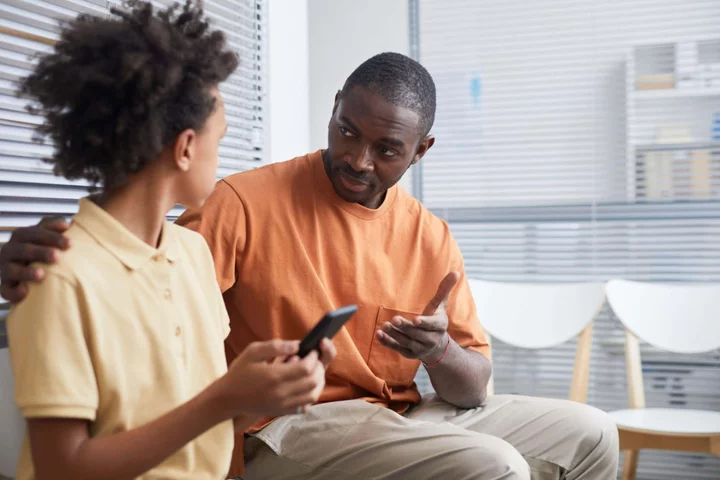
How to spot if your child is struggling with their mental health – and what to do next
Spotting when your child is struggling with their mental health, and knowing how to support them, can be tricky for parents and carers. It’s an important issue to be aware of, however. According to the Children’s Society, in the three years up to 2022, the likelihood of young people having a mental health problem increased by 50%, while children and young people’s mental health charity Place2Be says one in six children experience mental health difficulties, rising to one in four amongst 17–19-year-olds. Emotional disorders including depression and anxiety are among the most common problems to crop up. James Emmett, regional clinical lead at Place2Be, says although the Government has taken “great strides” to address the issue by introducing support teams and senior mental health leads in schools, “we’re still seeing a sharp increase in diagnosable mental health conditions among children and young people, now affecting one in six children – which is around five in every classroom”. Stevie Goulding, senior manager for parents and carers services at the charity YoungMinds, says: “More young people than ever are struggling with their mental health and are in need of support. This generation is facing a unique set of pressures – living through a pandemic, a cost-of-living crisis and ongoing global instability – and they’re worried about their future. “As young people navigate the ups and downs of growing up, recognising when to be concerned about your child’s mental health can be difficult.” Here, Goulding and Emmett outline how parents can spot whether their child may be struggling, and how to help… 1. Look for behaviour changes A change in behaviour is usually the first sign that a child or young person is feeling low, says Emmett: “They may eat too much or not enough, have problems sleeping, or stop doing things they normally enjoy.” Goulding adds: “If you notice changes in your child’s behaviour or if they appear persistently distressed, it could mean they’re struggling with their mental health, and it’s important to take their concerns seriously.” 2. Give them the opportunity to talk Goulding suggests parents try to talk to their child or teen about how they’re feeling in a non-judgemental way. “Remember, they might not want to open up at first, so reassure them you’re there for them when they’re ready to talk. Remind them it’s ok for them to feel scared or unsure, and try to reassure them,” she advises. 3. Don’t force them to talk However, Emmett says sometimes they may not want to talk, adding: “It’s important that adults don’t force them to have a conversation they don’t want to have. Parents and carers must make sure they’re available – but don’t pressure them to talk. “It can be really tempting to ask a lot of questions, but it’s easy to slip into interrogation mode. Try to focus on the here and now and what would help moving forward.” 4. Choose your momentAvoid discussing the underlying causes of your child’s distress with them during intense moments, Goulding advises: “While it’s crucial to provide support, it can be more beneficial to address these topics when they’re feeling calmer.” 5. Ask how they’re feeling Ask if your child notices when they feel more or less sad, for example, at school, or when they’re with their friends and family, suggests Emmett. “Responding sensitively to your child’s signals with concern and interest will help them learn you’re there for them,” he notes. Goulding says parents can acknowledge their child’s feelings by saying something like: ‘It’s completely understandable that you’re feeling…’. She explains: “This helps to reassure them their feelings are valid and it’s ok to feel different emotions.” 6. Remind them of obstacles they’ve overcome in the past When a child or young person gets overwhelmed, they forget just how much they’ve already dealt with in their lives. “Tell them stories about how proud you were when they coped with certain moments in their life, such as an sitting an exam, or moving house,” says Emmett. “This will remind them of their resilience – their ability to adapt to difficult situations.” 7. Encourage them to stay active Physical and mental wellbeing are often linked. “This means doing something active can be a great way to boost your child’s mental health, and heading outside into green space can have even greater benefits,” says Emmett. He suggests parents walk or cycle short distances with their child instead of going in a car: “It’s cheaper and will help the planet to be healthier too.” 8. Model positive relationships Happy relationships between parents and significant adults lead to better mental and physical health for everyone, stresses Emmett. “By modelling positive relationships of your own, you can help your child to see what positive, healthy and meaningful relationships should look like – and to recognise when friendships aren’t positive,” he says. 9. Remind them how they feel will change Your child might not be able to see the light at the end of the dark tunnel they’re in. “Reassure your child that how they’re feeling is temporary,” says Goulding. “Things can change and they can feel better.” 10. Discuss what help is available Talk to your child about the different sources of help that are available, such as helplines, text lines and online chat services. “Reassure them it’s alright to confide in others, as young people often worry about upsetting their parents,” says Goulding. As well as YoungMinds parents’ helpline (0808 802 5544) and Place2Be, other sources include your child’s school, which will have a designated senior mental health lead, your GP who can refer your child to CAMHS, Parenting Smart, which provides free advice for parents and carers of 4–11-year-olds on how to support their child’s wellbeing and behaviour, and the free Shout 24/7 textline for anyone in crisis (text SHOUT to 85258). Read More Does your pillowcase make a difference to your skin and hair health? Sarah Jessica Parker channels Carrie Bradshaw on the red carpet in mismatched shoes Does your pillowcase make a difference to your skin and hair health? As transphobic hate crimes rise by 11% in a year, how to be a better ally Impact of relationships with AI chatbot programmes ‘worrying’, psychologist says Pokemon’s Detective Pikachu Returns and more top games of the week
2023-10-09 14:53
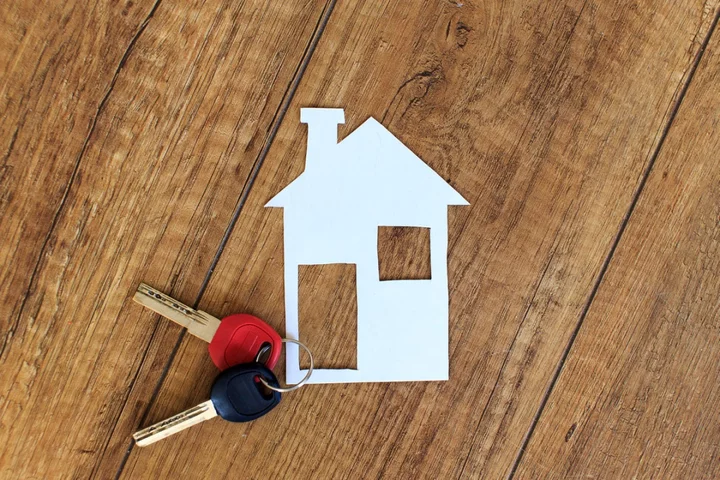
Brits reveal advice they would give their younger selves - including investing in property
Brits have revealed the advice they would give their younger selves – including investing in property as early as possible, taking more photos and not being afraid of rejection when asking someone out. A survey of 2,000 adults found 58 per cent would love nothing more than to give the younger version of themselves some good tips. Those surveyed said they would look after their physical health more, avoid wasting their time on negative people and learn from their mistakes. The top 20 list also included recommendations to save 10 per cent of your wages every month, spend more time with your parents and celebrate the little wins. But while 67 per cent would offer financial words of wisdom, 82 per cent felt positive knowing every decision they’ve made has led them to the point where they are now. And the same percentage (82 per cent) wanted to live their life with no regrets. AXA UK commissioned the study as part of its ‘Future You will thank you’ campaign which looks at how our future selves will thank us for the good choices we make today and reveals the decisions people are most thankful for. Scarlette Douglas, former A Place in The Sun host and I’m A Celebrity contestant, is taking part in the campaign discussing the forks in the road which led her to a career in television. She has contributed to an eBook revealing more of these insights from celebrities and the public. Scarlette said: “I had been performing in musicals for eight years when I made what I feel was a great decision at that point in my life, which was to move away from theatre and pursue a different career in television presenting. “I finished my last musical in 2014 and in 2015 I landed an amazing job as a presenter for A Place in The Sun – I had my first presenting role on a Channel 4 show. “I’ve now been in television for eight years and if I didn’t take a leap of faith and make that decision to leave musical theatre and pursue television, I would never be where I am now.” The study also found buying a house as soon as possible, getting married and heading off abroad were some of the things people are most grateful to their young self for. But when it came to regrets, 39 per cent had at least one big one in their life. Of those, 56 per cent said these were romantically linked, while 35 per cent had health-related regrets. Others spoke about how they wish they got to know parents and loved ones better before they passed away. Although 27 per cent had learnt from some of the regrets their parents had experienced. Architect and TV presenter George Clarke is also involved with the campaign and spoke about his first home. He said: “When I bought my first ‘grown-up’ house it was a wreck and definitely a building project. “We had to live in it while we did the work bit by bit over the course of three years – it was a major project and at the time we didn’t have a lot of money, so it was work, earn, do building work... repeat. “It was a major refurbishment and what made it even harder was our child was born during the build too. All of it was a big risk, especially a financial one. “The house looked amazing when we completed it, and although we loved it the financial pressure and the length of the build took its toll and we made the decision to sell. “We were very lucky with the sale and we were able to buy another house just a few hundred yards from the one we’d sold – that project began the journey of setting ourselves up for life.” The research also revealed that dropping a phone down the toilet, having to pay hefty vet bills and having their home flooded were the situations where people regretted not getting insurance. There was a desire among those surveyed, by OnePoll, to say yes more often, with people wanting to experience new travel and holiday destinations (46 per cent), new social activities and plans (35 per cent) and new friendships (34 per cent). Jason Fox, TV broadcaster, former UK Special Forces soldier and Royal Marines Commando, is also taking part in the initiative. He said: “When I left the marines after 20 years of service, I suffered from PTSD and had to learn to look after my mental health. “I realised I could also be useful in the civil world, by showing others that mental wellbeing is a strength, not a weakness. “When I was able to, the best decision I made was to invest in my mental health initiative and organisation ‘Rock 2 Recovery’ to support others in similar situations.” Tara Foley, AXA UK’s CEO, said: “Every decision we make impacts our future, from the biggest life choices to the smallest. “The findings show most people are pretty happy with the majority of decisions they’ve made, but they wouldn’t be averse to going back and giving their younger self a bit of guidance to influence how things turned out further down the line. “It’s encouraging that so many people say they aren’t living their life with regrets and it’s good to see a real desire to experience new things and push the boundaries, such as visiting far-flung places or trying new activities. “Making sure you’re always covered for every eventuality – whether it’s car, home, business or health insurance – means you can take on whatever life throws at you without worrying about unforeseen consequences or unexpected financial challenges.” Top 10 pieces of advice many people wish they could tell their younger self: 1) Be more confident 2) Try not to care what other people think 3) Don’t let opportunities pass you by 4) Look after your physical health more 5) Don’t waste time with negative people 6) Learn from your mistakes 7) Save 10 per cent of your wages every month 8) Eat healthily as it will pay dividends down the line 9) Go on all the holidays you can 10) Invest in property as early as you can 11) Don’t just settle for things 12) Just relax and enjoy the ride 13) Look after your mental health better 14) Spend more time with your parents 15) Celebrate the little wins 16) Take more risks 17) Don’t be afraid of rejection when asking someone out 18) Always be there for your mates 19) Take more photos 20) Be disciplined with your time Read More Brits are so fed up with emails that retail giants now send reminder letters Adults are eager to explore the world alone over the next three years, study finds Study finds more people are moving into high flood zones, increasing risk of water disasters Chris Hemsworth shares big life changes after ‘shocking’ health warning How to get rid of bedbugs: Signs and symptoms amid threat of UK invasion I have felt the shame of infertility – it’s why I started a club for women like me
2023-10-06 19:49
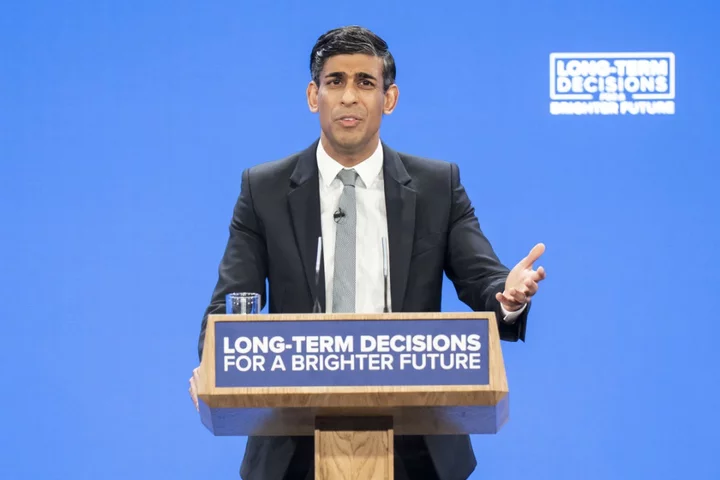
How to talk to kids about cigarettes and vapes, following Rishi Sunak’s smoke-free generation plans
Stopping the nation from smoking has long been a top priority for medical experts, families and governments, and PM Rishi Sunak has made his plans for the issues clear. At the 2023 Conservative Party Conference, Sunak said that the legal age for buying tobacco should rise every year from those born in 2009 in a bid to “try and stop teenagers taking up cigarettes in the first place”. He said: “A 14-year-old today will never legally be sold a cigarette” under new legislation he is proposing for England. The Prime Minister also said more must be done to “restrict the availability” of vapes to children, but what can be done by parents in the meantime? Here are the conversations to have with your children… The dangers of smoking “Starting smoking and vaping at a young age can have serious and long-lasting health consequences,” explains Dr Chun Tang, medical director and GP at Pall Mall Medical. “Nicotine is particularly harmful to developing brains. Young people are more vulnerable to nicotine addiction, which can lead to a lifetime of tobacco dependence. Nicotine impacts cognitive function and memory, potentially affecting academic performance. “Aside from the detrimental effect on cognitive ability as outlined above, smoking is, of course, a leading cause of various health problems, including lung cancer, heart disease, stroke, chronic obstructive pulmonary disease (COPD), and many others,” he says. “Smoking during adolescence can also interfere with the growth and development of the lungs, leading to reduced lung function. This can result in breathing difficulties and decreased physical performance.” The dangers of vaping Vaping isn’t a safe alternative, yet he sweet-smelling, plastic steam machines are rife. “Vaping is a relatively new phenomenon, and the long-term health effects are still not fully understood,” says Tang. “There is ongoing research to assess the potential long-term risks, including the development of chronic health conditions.” Vaping has been associated with various adverse health effects, including lung injuries, respiratory problems, and cardiovascular issues, he notes. “Some of the chemicals found in vaping aerosols can be harmful when inhaled into the lungs. “If a smoker takes approximately 15 puffs of a cigarette before putting it out, then we can safely assume that a 600-puff disposable vape is equivalent to around two packs of cigarettes. “Some reports suggest young people can get through as many as 7 vapes a week, the equivalent of 14 packets of cigarettes. “That is an enormous amount of nicotine and so we can expect to see the health risks posed by nicotine to be [more] exacerbated in vapers than smokers – which could be severely impacting cognitive function and affecting academic performance.” It’s essential, he says, for parents, educators, and healthcare professionals “to educate young people about the potential risks of vaping and smoking and provide support and resources for those who want to quit”. Don’t lecture them Try to be open and curious rather than defensive and angry if your child is smoking or vaping. Dr Kerry Irving, senior clinical psychologist at online mental health platform Kooth, says: “Approach any conversation to understand why the young person smokes or vapes rather than to lecture, as the latter can cause people to shut down.” Consider available supportThere may be resources online and in person that might help your child, from the NHS to TikTok creators tracking their quitting journey. “Suggest accessing external support – encourage the young person to see their GP or to make use of some of the free Stop Smoking initiatives online or in your local community,” Irving says. Be sympathetic to relapse Expect wobbles. If your teen or child is quitting smoking or vaping try to stop accept that overcoming an addiction is not easy and recovery is not linear. “Relapses are an important part of changing any behaviour long term,” says Irving. “You can help the young person learn from these by gently encouraging them to reflect on what went wrong and helping them plan for how to try again.” Read More Charity boss speaks out over ‘traumatic’ encounter with royal aide Ukraine war’s heaviest fight rages in east - follow live 4 must-have denim trends for autumn, from wide-leg jeans to split skirts Doorscaping: How to create a fabulous front door display for autumn More than a quarter of middle-aged women living with ‘metabolically healthy obesity’ – study
2023-10-05 19:46
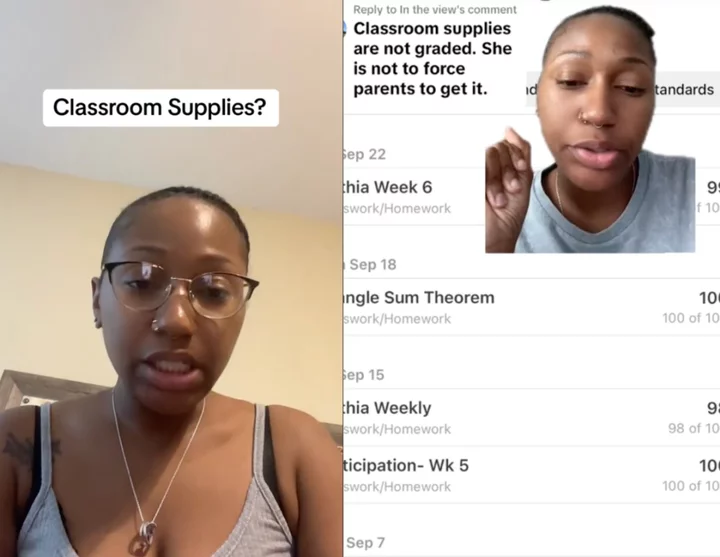
Mother sparks debate after claiming her son received a ‘zero’ grade because he didn’t have classroom supplies
A mother has sparked a debate after revealing that her son received a “zero” from his teacher because he didn’t bring in “classroom supplies”. The parent, Shanitta Busby, shared a recent video to TikTok about her 13 year old, in which she explained that he recently started at a new school. She noted that, prior to the middle schooler’s first day, she bought him “new school supplies,” since the list of supplies needed was “a little different” than ones she’d seen before, and she “wanted him to be prepared”. Busby said that while her child’s first week at school went well, he came home the second week and told her: “My teacher said we need to have classroom supplies.” She responded to her son by saying it was strange that his teacher wanted him to have certain “classroom supplies”. “I’m like: ‘That’s weird, because we got you everything on the list that you would need for the class. And you’re not going to be using any classroom supplies,’” she recalled. “And so I left it at that.” However, according to Busby, the teacher later told her son that she’d “give [him] a zero if [he] didn’t turn in the classroom supplies”. While the parent questioned why her son was being graded for having the items, she said that she still went on to get the “classroom supplies,” which included things like tissues, Clorox wipes, hand sanitiser, pencils, Expo markers and red pens. Although she gave her son these supplies to turn in to his teacher, she said that the following week, her son “still had a zero”. She explained that when she emailed the teacher about the grade, she also claimed that parents shouldn’t be responsible for “supplying” the items needed in the teacher’s classrooms. “I email the teacher and I’m like: ‘Hey, I’m kind of concerned because my student has an 83 in the class, and everything else in the class is 100s and 98s. And he still have a zero for something called classroom supplies,’” she recalled. “I was like: ‘We bought the supplies anyways, but I don’t feel like it’s the parent’s responsibility to supply your classroom.’” She also told the teacher that she didn’t “think it was appropriate to assign a grade to students based on whether or not they’ve supplied” their teacher’s classroom. According to Busby, the teacher responded to the email by saying: “I appreciate an involved parent, and I’ll update his grade today.” However, the teacher didn’t address the parent’s concerns about the grade itself existing. @shanittanicole Am I doing too much? #fyp #school ♬ original sound - Snooze ❣️ “She said nothing about the fact that we shouldn’t have to supply your classroom with supplies,” she explained. “So I emailed the principal, I might be extra, but I just wanna see what’s going on. Why do I have to buy supplies for the classroom? In the comment, she clarified that she and her husband bought the supplies that were needed for his homeroom, as he’s in middle school. She then specified that the grade he got for “classroom supplies” was for only his math class. Busby later shared a follow-up video with a screenshot of her son’s grade in the class, noting that there were two different grades for his “supplies”. While he got 90 for his “homework/classwork,” in the “supplies section”, he initially had a zero under the “participation” for “supplies”. However, his zero was then updated to a 100, giving him a 98 in the class. She then emphasised why she contacted the principal about her son’s “supplies” grade, adding: “Why are you assigning a grade for additional school supplies for the classroom? That’s what was wrong to me.” In the comments of the two videos, which have received more than 1.5m views combined, many people came to the parent’s defence, noting that some parents can’t afford all classroom supplies, so children’s grades shouldn’t be penalised for that. “Classroom supplies are not graded. She is not to force parents to get it,” one wrote, while another added: “That is so unfair!! Especially for the kids whose parents CAN’T afford groceries let alone classroom supplies!!!” “Somebody has to buy supplies and it’s not fair to the teacher. BUT they pool the supplies because everyone can’t afford them. To grade that is ridiculous,” a third commented. On the other hand, some parents acknowledged that they would get certain school supplies for their children, and defended teachers from having to buy them. @shanittanicole Replying to @In the view Graded School Supplies Part 2 #fyp #school #xybca ♬ original sound - Snooze ❣️ “I will buy anything my kids’ teachers need. I usually send $200 through a cash app per 1/4. Teachers shouldn’t have to buy either,” one wrote, while another added: “The grade I don’t agree with! As a former teacher, I spent a lot of my personal money on supplies. New teachers don’t even get a stapler.” “Teachers don’t make anywhere near enough to supply everything for classrooms, like tissues if your kid has a runny nose. Or wipes to clean messes,” a third wrote. Speaking to Insider, Busby said she’s still waiting to hear back from the principal on how the situation is being handled. She also shared her belief that the school districts should be giving supplies needed in classrooms, rather than having parents or teachers pay for it. The Independent has contacted Busby for comment. Read More Six-year-old girl with special needs found wandering busy road after school sent her home Father praised after teaching his daughters how to set expectations when dating men A Georgia woman confided in a friend about her relationship’s ‘tough times’. Four days later she was dead Man inundated with criticism after judging mum on her phone Brian Austin Green details stroke-like symptoms caused by diet: ‘I couldn’t speak’ Woman reveals how she discovered she’s allergic to water
2023-10-05 06:25

Brian Austin Green says he had stroke-like symptoms caused by his diet: ‘I couldn’t speak’
Brian Austin Green has revealed he suffered from stroke-like symptoms for four years that were ultimately caused by his diet. The Beverly Hills, 90210 alum, 50, recently opened up about his major health struggles - which included vertigo and ulcerative colitis - that led him to be bedridden for three months and unable to speak, read, or write. In an episode of the Sex, Lies, and Spray Tans podcast with Dancing With the Stars dancer Cheryl Burke, released on 2 October, Green revealed that it wasn’t until a “kinesiology and Eastern medicine” specialist discovered he had “internal inflammation” from his diet of gluten and dairy that he was able to take control of his health. “I spent four and a half years recovering from stroke-like symptoms without ever having had a stroke,” the Anger Management star said. “I couldn’t speak. I couldn’t read. I couldn’t write.” When asked by podcast host Burke if his “neurological” issues were a result of having vertigo - a sensation that the environment is spinning in circles - Green explained that his vertigo symptoms were just “one stage” of his health problems. “I had ulcerative colitis and then I had vertigo,” he said. According to the Mayo Clinic, ulcerative colitis is an inflammatory bowel disease that causes inflammation and ulcers in the digestive tract. “I was bedridden for like three months but both things were undiagnosable,” he continued. “Nobody could figure it out, all the specialists that I saw.” Burke asked whether his symptoms were a result of a car accident, seemingly referring to when Green and his ex-wife, Megan Fox, were struck in their vehicle by a drunk driver in December 2014. “No. It was dietary,” he replied. Despite getting an opinion from one of the top neurologists at Cedars-Sinai Medical Center in Los Angeles, and undergoing nearly 200 blood tests and two MRIs, his doctor was still unsure of what Green’s health issue could be. The actor recalled that his symptoms of “brain fog” were so bad that he once reintroduced his best friend of 25 years to his sister, who his friend had also known for more than two decades. Green shared that even reading Dr Seuss books to his children was difficult for his brain. “It was all undiagnosed by Western medicine, so I ended up having to finally find a doctor that is much more into, like, kinesiology and Eastern medicine,” he said. Once finding a specialist, the doctor told Green that his health condition was a combination of stress and consuming “gluten and dairy”, which caused “internal inflammation” in his system. These days, Green shared that he’s “fully recovered” from his stroke-like symptoms and his health has been “100 per cent” since then. Green is a father to five children. He shares son Kassius Lijah, 21, with ex-girlfriend Vanessa Marcil. The Desperate Housewives alum also shares sons Noah Shannon, 11, Bodhi Ransom, nine, and Journey River, seven, with ex-wife Fox. He and the Jennifer’s Body star were married from 2010 to 2021. In June 2022, Green welcomed his fifth child, son Zane Walker, with fiancée Sharna Burgess. Read More Brian Austin Green gets candid about how great co-parenting is with ex Megan Fox Brian Austin Green shuts down claim he’s a ‘bad father’ after defending Megan Fox over sons’ outfits Megan Fox hits back at US politician’s claim about her children’s clothes Woman reveals how she discovered she’s allergic to water More than a quarter of middle-aged women living with ‘metabolically healthy obesity’ – study Idris Elba reveals he’s been in therapy for over a year after work realisation
2023-10-05 00:58

More than a quarter of middle-aged women living with ‘metabolically healthy obesity’ – study
Almost one in 10 middle-aged men and more than a quarter of middle-aged women in the UK are “fit but fat”, researchers have said, as they called for more to be done to help people reduce their weight. Academics said that there are large regional differences over levels of “metabolically healthy obesity”, which could be down to different diets or other lifestyle factors as well as ethnic and genetic differences. People who are “fit but fat” are considered to be obese by their body mass index (BMI) score but have none of the complications associated with obesity including abnormal blood sugar levels; high cholesterol; high blood pressures; type 2 diabetes or other signs of heart disease. The UK has similar levels seen in Sweden, Norway and Germany, experts said. The highest proportion of metabolically healthy obesity is observed in France and other Mediterranean countries such as Italy and Israel, experts told the the Annual Meeting of the European Association for the Study of Diabetes. There will always be people living with obesity who seem to be protected against obesity-related cardiometabolic diseases Prof Mattias Bluher One study shows that 8% of men and 27% of women in the UK aged between 40 and 50 are living with “metabolically healthy obesity”. Asked how many people in the UK are affected, Professor Matthias Bluher, of the University of Leipzig and Helmholtz Centre Munich in Germany, said: “The (UK) is very similar to situation Sweden, Norway and Germany. “There are populations in Micronesia or Asian populations where it is down to 2-5% only. “Some populations may be, despite large amounts of adipose tissue, better protected against comorbidities and Caucasian populations belong to those.” Prof Bluher said that healthy obesity is seen in a number of premenopausal women. It comes as Prof Bluher called for better weight management programmes for people who fit the profile. He pointed to previous work which suggests people who are “healthy obese” have a higher risk of coronary heart disease, cerebrovascular disease and heart failure compared to their in a normal weight range. “There will always be people living with obesity who seem to be protected against obesity-related cardiometabolic diseases,” he told the conference. “The concept that metabolically healthy obesity affected people may not benefit from weight loss strategies has been challenged by recent data. “A timely and personalised treatment of obesity should also be recommended to people living with healthier obesity.” Read More Charity boss speaks out over ‘traumatic’ encounter with royal aide Ukraine war’s heaviest fight rages in east - follow live Jonnie Peacock on Strictly Come Dancing representation: ‘It’s important to break people’s perceptions’ What you need to know about depression during menopause – as Carol Vorderman opens up Autumn pests to look out for and how to get rid of them in your home and garden
2023-10-04 16:50

Jonnie Peacock on Strictly Come Dancing representation: ‘It’s important to break people’s perceptions’
BBC One’s Strictly Come Dancing has been “fantastic” for disability representation, says Jonnie Peacock MBE – the show’s first amputee contestant. The sprinter and paralympian, who was partnered with professional dancer Oti Mabuse in 2017, helped pave the way for celebrities with disabilities, including presenters Rose Ayling-Ellis and JJ Chalmers. The new 2023 series sees cyclist and swimmer Jody Cundy – who, like Peacock, had his right leg amputated just below the knee – compete with Jowita PrzystaÅ‚, who lifted the glitterball trophy last year with Hamza Yassin. “For me, going on Strictly was important to attempt to break people’s perceptions and make them realise the reason that I would be a bad dancer would absolutely not be my leg,” says the 30-year-old. “My leg is actually one of my strong suits! “Rhythm,” he laughs, “That was more the problem.” Peacock – who became a household name after smashing the world record and claiming gold in the 100m T44 final at London 2012 Paralympic Games – said by appearing on the popular dancing show, he was “trying to get people to understand that we look at someone and we instantly judge what they’re able to do, and put them in a box”. The World Health Organisation estimates that 16% of the world’s population is disabled. “But when you look at your TV – especially 20 years ago – it [looked like] 0.1%, and the same with race and gender,” notes Peacock. “Now people are starting to realise that we want our world to be reality, and we want our [TV] world to encompass what it actually looks like. “It’s not just Strictly, pretty much all of the reality TV shows have disabled contestants in [now]. It’s so important. It’s a way to show that we are an individual, and that we have something to give.” Peacock was recently made an ASICS ambassador (“It’s really cool to be working with a brand who actually care about a lot of the things I care about – that it’s so much more than sport,” he says). And after a difficult summer on the track, he’s looking ahead to the indoor winter para season and the Paris Paralympics next summer. “I felt the worst I’ve felt in years, as soon as I got past 50 or 60 metres [during Paris Para Athletics World Championships in July],” says the sprinter, who later discovered he had hamstring tendinopathy. “I’d kind of lost the love of the event. Even though I love training, I didn’t enjoy competing too much. Even though I love doing it, it was bringing me a lot of misery.” As well as injury niggles, he’s been having issues with the alignment of his prosthetic blade. For para athletes, this technical side of the sport adds additional complication. “I used to love that, but there was a couple of years where I just felt off balance and didn’t realise why,” he says. “We had to play with so many different settings… that was the moment where I was constantly [thinking], ‘I wish I had a foot there where it should be, I wish I didn’t have to worry about setting this up and could just go for it’.” Peacock was five when he almost died from meningitis and his right leg had to be amputated – a time he has few memories of (“I have one flashback in the back of the car being rushed to hospital, with my Power Rangers duvet wrapped around me”). Growing up, he had several bone revision surgeries – “because once you’ve had an amputation, the bone will carry on growing,” explains Peacock. Now though, he’s showing no signs of slowing down, even though sprinter careers are notoriously short. For the next Paralympics, “It’s gold or nothing – Felix [Streng of Germany] has got it now [after Tokyo 2020], but my plan is to hopefully make him the shortest Paraylmpian champion ever.” After being so dominant in the 100m for so long (he’s a two-time Paralympic gold medalist, two-time world champion, and two-time European Championship gold medalist), what keeps him motivated to win? “It’s probably greed,” he laughs, “It’s just never enough, you just want more, it’s an addictive feeling. It’s like you’re just constantly chasing to try be a better athlete – a better version of you.” And with age has come a better understanding of how his own happiness and mental health is tied to his physical health. “I don’t exercise for a period of time, I can get a little bit almost, not depressed, but edging on that, just not happy, very lethargic,” he reveals. Youth comes with a blissful naivety about health, he says. Before, “I never really realised that every time I exercised, I felt better afterwards. Now [my body] is more sensitive. I don’t feel fantastic 24/7, creaks and aches start to appear, grogginess, fatigue…” These days, when he’s not feeling his best, he’ll start a day with a 15-minute indoor bike session at home, where he lives with para athlete girlfriend Sally Brown. “I hate it, I literally hate it!” he laughs. “I want to sit on the sofa and watch TV [instead]. I feel atrocious for 10 minutes afterwards, but then I bounce up so high for the rest of the day, I’m so happy. “The closest thing that affects my mental health is my [physical] health. If I eat like crap, if I sleep like crap, if I don’t exercise, I will be in a bad mental health space. If I exercise, even just a little bit, if I eat well, if I sleep well, I don’t feel like that. It’s understanding there’s a cause and effect relationship to a lot of things.” He swears by the feel-good endorphins of a freezing cold shower everyday. “My friend told me about Wim Hof [the Dutch endurance athlete known as The Iceman] six or seven years ago. I hate hot showers now, to the point where I was in a hotel once and had to get the engineer to come up because the shower didn’t go cold [enough].” Peacock says he tries to remember that “life is a game” and “a gift”. He continues: “We waste it because we take it too seriously. And we’ve been forced to take it too seriously by the outside world – we’ve been given pressures, we’ve been given expectation, and you end up allowing the stress to enclose you and take you away from that childhood mentality of just going out and having fun. “When you’re dead, you’re not going to be sitting there going, ‘Oh, I wish I’d kept my boss a bit happier’.” Jonnie Peacock is sponsored by ASICS. To find out more visit asics.com. Read More Charity boss speaks out over ‘traumatic’ encounter with royal aide Ukraine war’s heaviest fight rages in east - follow live What you need to know about depression during menopause – as Carol Vorderman opens up Autumn pests to look out for and how to get rid of them in your home and garden How can I tell if my child has ADHD?
2023-10-04 15:26

How to get rid of bed bugs? The signs and symptoms as infestation could make its way from Paris to London
It was a not-so glamourous end to Paris Fashion Week, as a “widespread” outbreak of bed bugs caused panic and disgust in the French capital. Paris authorities sent out a public warning that “no-one is safe”, with the small insects making their way through the city. In recent weeks and months, there have been numerous sightings on public transport and other locations. “No one is safe. You can catch them anywhere and bring them home, and not detect them in time until they have multiplied and spread,” deputy mayor Emmanuel Grégoire, told French TV. Videos posted on social media show insects crawling over seats on the Paris Metro as well as appearing in huge numbers on cinema seats. Some users have also shared their experiences of being bitten by the critters. So, how can you help protect yourself against a bedbug infestation? Here’s everything you need to know. How do you know if you have bed bugs? To find out if you have bed bugs, it’s best to keep an eye out for two things: 1. Bites on your body – these look like little red marks that cause itchy welts. “These welts usually appear in a zigzag pattern,” the American Academy of Dermatology Association says. 2. You should always keep an eye out for signs of bedbugs, this includes odour, specks of blood on bedding, exoskeletons, tiny blackish specks and eggs. • Odour: If you notice a sweet or musty smell in your sleeping area, there might be a heavy infestation in the room, the AADA says. • Specks of blood: Look at your bedding, mattress and furniture – if you notice specks of blood anywhere, the insects might have made their way into your home. • Exoskeletons: The small insects have an outer shell that they shed and leave behind. Check for remains on your bedding, mattress and cushions. • Tiny blackish specks: The blackish specks are a sign of beg bug excrement. • Eggs: “After mating, female bed bugs lay white, oval eggs in cracks and crevices,” the AADA says on its website. These will be in the size of an apple seed, so keep your eyes peeled. How do I treat bedbug bites? The NHS says bedbug bites usually clear up on their own in a week or so but there are a few steps you can take to help you during your recovery process: • Put something cool, like a clean, damp cloth on the affected area to help with the itching and to ease off any swelling. • Be sure to keep the affected area clean to prevent any further infection. • Try your best not to scratch the affected area. You can also get steroid creams like hydrocortisone cream to ease bedbug bites. However, children under 10 and women who are pregnant should get advice from a doctor before using this cream. Another option would be to use antihistamines, these may help if the bites are very itchy and you’re unable to sleep, the NHS says. How to get rid of bed bugs – the do’s and don’ts It can be hard to get rid of the small insects on your own, so you might need to contact your local council or pest control service to get rid of the pesky creatures. Here are some steps you can take to reduce bed bugs: • Remove the affected bedding and clothing – wash on a hot wash of 60c and tumble try on a hot setting for at least 30 minutes. • You can also put the infested bedding and clothing in a plastic bag and place It in your freezer for 3 to 4 days. • It’s time to up your cleaning game – “bedbugs are found in both clean and dirty places, but regular cleaning will help you spot them early,” the NHS adds. Here’s what you should avoid doing: • Do not keep clutter around your bed, try to keep your space as clean as possible. • Do not bring second-hand furniture indoors unless you have cleaned and carefully checked it. • Do not take luggage or clothing indoors without checking it properly – especially if you have come from somewhere where you know there are bedbugs. What are the causes of bedbugs and where do they live? The wingless parasitic insects are found all around the world and may be linked to, more frequent travel, changes in pest control practices and insecticide resistance. Bedbugs can be found in: • Clothing • Luggage • Bedding • Boxes • Box springs • Mattresses • Headboards • Objects near beds According to the Mayo Clinic, they can also be found: • Under peeling pain or loose wallpaper • Under carpeting near baseboards • In upholstered furniture seams • Under light switch plates or electrical outlets Can bed bugs reach the UK? The short answer is yes… Bed bugs have a lifespan of between four to six months and are known to cling onto dirty suitcases – so it is possible that they may hitch a ride on the Eurostar which is just two hours away from London. The Independent’s Barney Davis asked David Cain, founder and MD of Bed Bugs LTD and a qualified microbiologist, whether the bugs could survive the journey. “Easily, yes, without a shadow of a doubt,” he responded. Read the latest on the bed bug infestation in Paris here. Read More Is London prepared for the mutant bedbug invasion that has swarmed Paris? That will bug you: Thousands of mosquitoes take over walls of bathroom Hotel worker shares tips on how to hunt out bed bugs How to get rid of bed bugs? Everything you need to know Idris Elba reveals he’s been in therapy for a year due to ‘unhealthy habits’ Having an overweight pet could cost owners over £1,000 in vets’ bills
2023-10-04 13:22
